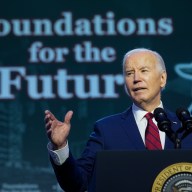ST. JOHN’S, N.L. – The Newfoundland and Labrador government took such an interest in how a health board communicated with the news media about problems with breast-cancer tests that it vetted its news releases, a public inquiry was told Thursday.
George Tilley, former CEO of the Eastern Health authority, said he faced a growing expectation to have the Health Department review its news releases before they were issued, as the scope of the testing problems grew in 2006.
“We did go through a period of time where press releases that we were issuing on various issues – there was an expectation that we would run those by the department,” Tilley said.
“It was an evolving process. Certainly in our earlier days it was done to their exclusion and any inclusion would be more by coincidence. But clearly, as time went on, there was a greater expectation that things would be shared and an opportunity for advice to be given.”
The need to have a closer relationship between communications personnel within the provincial government and Eastern Health came up at a Dec. 4, 2006, meeting with two media relations directors and the deputy minister of health, Tilley said.
“The department wanted to know about any messages that were being delivered before they were,” Tilley said.
“In general, if the deputy or the minister came over and said, ‘George, we have a problem with regards to what’s in there or what’s not in there,’ then I would expect it to come to my attention and that we would resolve it before we made the next move.”
“If you didn’t get any negative feedback or any expression of concern, would you take that as approval?” asked inquiry counsel Bern Coffey.
“After a reasonable period of time, I think we would, yes,” Tilley replied.
But Eastern Health staff became increasingly frustrated with delays in getting responses from the province, he added.
“It made us wonder what process they might be going through in their circles to assess what we had sent over,” he said.
Tilley said he was given no indication whether the government was unhappy with the way Eastern Health handled communications. But he said he was told the change in protocol was simply a reflection of how the government wanted communications managed.
On Dec. 11, 2006, Eastern Health held a technical briefing for reporters to discuss the breast-cancer testing errors.
In preparation of that briefing, Eastern Health’s communications director sent an e-mail to Tilley and several other high-ranking executives at the health board.
In the Dec. 9, 2006, note, Susan Bonnell drew their attention to the fact Eastern Health would not be disclosing the rate of error discovered after a review of breast-cancer tests from 1997 to 2005.
“We can anticipate that this will be a major pressing point with the media, but the approach we will be taking here is that (a) we can’t indicate that an error is actually occurred and (b) the whole process wasn’t about identifying a rate of error anyway – it was about identifying patients whose treatment would change,” Bonnell wrote.
“Re: the dead, we must also be prepared. Our statement will need to be that, in this almost 10-year period, individuals have died, either as a result of their breast cancer or for any one of numerous reasons.”
At that time, Eastern Health was aware that more than 300 patients received incorrect results on their breast-cancer tests. But at the media briefing, Eastern Health officials spoke of a much smaller group – the 117 patients who had their treatment changed after they were told about the faulty tests.
Half a year later, in May 2007, Tilley apologized at a news conference for the “confusion” that arose when Eastern Health failed to fully disclose the number of patients who were given inaccurate breast-cancer tests. He resigned two months later.
The inquiry is trying to determine how nearly 400 patients were given flawed results on their breast-cancer tests over an eight-year span and whether Eastern Health or any other responsible authorities responded to patients and the public in an appropriate and timely manner.
The inquiry is focusing on hormone-receptor tests, which are used by doctors to determine the course of treatment for breast-cancer patients.
If patients are found to be estrogen-and/or progesterone-positive, they may respond to hormone therapy such as Tamoxifen. If not, they may be given a range of other treatments, or no treatment at all, depending on the characteristics of the patient’s cancer.
In the spring of 2005, doctors began questioning the hormone-receptor test results of a patient with invasive lobular carcinoma, a form of breast cancer.
After retesting, it was discovered that the initial test result was wrong, as were those for a small sample of other patients.
Eastern Health subsequently halted testing in its lab and transferred its hormone-receptor tests to Mount Sinai Hospital in Toronto.
The health board then started a review of all hormone-receptor tests from 1997 to 2005.
The inquiry has adjourned until Monday, when it will begin hearing evidence from Louise Jones, the current CEO of Eastern Health.
Due to other commitments, Tilley’s testimony will resume at a time to be determined.
















